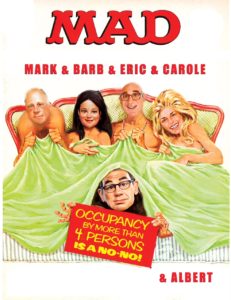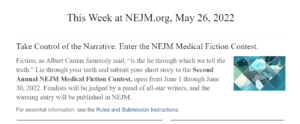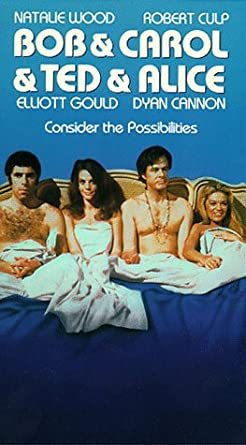
If North Americans don’t know much about Asterix cartoons – see The Harmed, Europeans don’t know about MAD. This image was adapted by Nina Otulakowski from a front cover image in Mad, see below, featuring the 1969 Bob, and Carol, and Ted and Alice movie.
Born in the USA
Multi-Regional Clinical Trials (MRCT) was born in the USA in 2009. Pfizer had just resolved a case with the US Department of Justice for $2.3 billion, then one of the biggest resolutions of an action against a corporation.
The company convened a meeting of other pharmaceutical companies, contract research organizations (CROs), institutional review boards (IRBs) (ethics committees in Europe) and lawyers, especially Ropes and Gray, a Boston law firm, later involved in GSK’s defense against a Department of Justice action, resolved in 2012 with a payment of $3 billion. This meeting created MRCT.
A later MRCT website listed Mark Barnes and Barbara Bierer as its founders. Barnes is a lawyer variously linked Ropes and Gray, Harvard, and Pfizer. Bierer is a professor of medicine (haematology) at Brigham and Women’s hospital.

It seems clear that industry and its advisors/consultants were aware that transparency was a coming issue. A fraud action taken by New York State against GSK in 2004, centered on the mismatch between a company publication and the underlying Study 329 trial data, demanded an industry answer to the transparency problem.
Responsible Access
In early 2013, MRCT convened a meeting with 36 people present. One third were company people, one third lawyers or regulators and the remainder a mixed group of Brigham and Women’s staff, MRCT staff, along with Jeffrey Drazen editor of the NEJM, a business consultant, and a patient advocate (if that is the right name for someone from a company whose business involved selling patient conversations about drugs to pharmaceutical companies). It is difficult to know if there were even two people at the meeting in regular clinical practice.
Later in 2013, the New England Journal of Medicine (NEJM), which in the form of Drazen was party to MRCT, published a paper on Responsible Access to Clinical Trial data that advocated the same model of clinical trial data sharing as AllTrials (see below).
Preparing for Responsible Sharing of Clinical Trial Data, the 2013 NEJM article, had six authors – four lawyers, Michelle Mello JD, Jeff Francer JD, Mark Wilenzick JD, Mark Barnes JD, one doctor Barbara Bierer MD, and one business consultant. All had been present at the earlier meeting.
In 2014, MRCT held a meeting on access to clinical trial data. There was a general enthusiasm for the idea. Bierer was the only medical author on the Responsible Sharing of Clinical Trial Data papers. Her take on data sharing was that:

I don’t think most people appreciate how much we know as a result of clinical research. To gain that knowledge – to determine treatments that are safe and effective – we are dependent on people who volunteer for clinical trials. If you get a therapy today that was based on years of study, you’re the beneficiary of other people’s volunteerism. We’re all in this together.,
Presentations at this MRCT meeting talked about data generators, a term that broadly speaking includes industry and non-industry trials. Some presenters (academics) at these meetings argue for the same set of rules for all data generators, as would be appropriate for science.
A neutral term like data generators conceals the conflicting interests data generators can have. Barnes above made this conflict explicit:
We need to remember the role of directly involved commercial interests as funders. It may be great to share data – let a thousand flowers bloom – let’s share everything. This may be true for academic research but if commercial funders believe their commercial interests will be affected the funding will dry up. The capital will go elsewhere. They won’t fund it.
MRCT Special Missions
Between 2009 and 2014, key MRCT players were grappling with Pfizer’s growing difficulties in Nigeria over Trovan and other problems.
All Western pharmaceutical companies were faced with problems in India, which had become an important center for clinical trials. In 2010, the deaths of 7 girls in HPV vaccine trials led the Indian government to clamp down on clinical trials and introduce a stricter code of practice.
This new stricter code of practice led to a 2014 MRCT workshop in India, a central feature of which was to review what could be said about causality assessments in the event of adverse effects. This will be outlined in a forthcoming Harmatology post.
MRCT materials from 2014 emphasize that clinical trials have become global and different jurisdictions can throw up issues ‘investigators’ and companies have never confronted before. The use of ‘investigators’ in texts like this refers to clinicians like Stephen Thomas, first author of the Pfizer vaccine trial in adults but it is as ornamental as having a ‘patient advocate’ at an MRCT workshop. Other than rhetorically, no medical academic has been an investigator in a company trial for decades.
On one level what was at stake in 2014 was the outsourcing of an industrial development process to India, China and Africa. The more recent development of virtual trials opens up a path to ignoring these countries.
In 2017, MRCT launched Vivli, notionally a Center for Global Data Sharing. Company trials however had been run in Africa, Latin America and Asia for two decades before Vivli, so running trials outside the US was not new. What was new was the idea of responsible sharing of trial data, as was an embrace of data sharing more generally, which a decade earlier companies resisted and then reluctantly tolerated.
There was another factor – which will run as a separate post ‘Harmatology’.
Responsible Access to Clinical Trial Data sounds as difficult to object to as motherhood and apple pie. Suspicions that Responsible Sharing of assay data, if supported by pharmaceutical companies and their lawyers, cannot be as good for us as motherhood and apple pie have, however, some basis.
RCTs necessarily have a primary outcome, without which the statistics do not make sense. This outcome is only one of more than a hundred things a drug may be doing, and quite often the effect of commercial interest will not be the most common effect.
Focusing on one uncommon and uncertain effect often renders other effects invisible. In the case of antidepressant RCTs, for instance, the benefit is uncertain compared with the effect of these drugs on sexual function, which is immediate, and close to universal, but the intense focus of an RCT means that these sexual effects vanished in antidepressant trials.
This focus on one effect means that, despite rhetoric claiming RCTs offer gold standard knowledge, they are not a good way to evaluate a drug. See The Fault Lies in our Stars and Fawlty Stars.
The focus also means that the entire RCT is primarily structured to provide certain datapoints. An emphasis on responsible access with an approved analytic plan means any subsequent investigators can essentially only come to much the same answer as the company already has.
It is possible, as in Study 329, that a new set of investigators might find a benefit claimed in the original publication doesn’t stack up, but, if so, responsible access to assays can come to the rescue. Quite predictably, when all 30 RCTs done of antidepressants in children who are depressed are negative, stacking them all together can pull out a positive effect, which can then be used to claim these drugs work, despite every single trial being negative.
The current proliferation of meta-analyses on pediatric antidepressant trials shows just this, which is ironically being sold as precision medicine.
It will come as no surprise then to find that MRCT-Vivli aim to facilitate data sharing across comparable trials.
The Pfizer input on data sharing to the Vivli platform needs to be read against this background. The company will support data sharing and will evaluate proposals under the following heads:
- Is the research question clearly defined with a scientifically valid rationale?
- Is there a well-documented and rigorous statistical analysis plan?
- If the proposal includes combining data across different Pfizer trials, is there a clear plan to standardize data sets to ensure they are comparable?
There is little here about Vivli making trials possible in non-Western settings and everything about data-sharing as optimizing the assay function of company trials.
Translating what is being said for lay people, you are being told you can access this data for efficacy purposes but if you are interested in treatment harms forget it.
The New England Journal of Misinformation under Drazen and now Rubin, Eric Rubin Boston Strangler, has essentially devolved into an outlet for efficacy studies. Eric made this point clearly in a lecture he gave on March 29 2022, for the Berkshire District of the Masachusetts Medical Society.

What has happened is perhaps best caught in this screenshot of a recent NEJM initiative.

NEJM is dragging the Massachusetts Medical Society along with it – see So Long and thanks for all the Fish, which brings Carole Allen into the frame. She was then the President of the MMS, which has some responsibility for the NEJM – although insiders say very little influence.

Shared DNA or Shared mRNA?
MRCT shares DNA (Do Not Access), or perhaps mRNA (messenger Responsible Non-Access), in common with AllTrials.
All Trials began in the UK in 2013, immediately after GSK, defended by Ropes and Gray resolved a Department of Justice case for $3 billion.
AllTrials was a coalition involving BMJ, the Cochrane Collaboration, the Centre for Evidence Based Medicine, GSK and Sense about Science. Sense about Science set up in 2002 and is effectively an outsourced PR department for the pharmaceutical and other industries. See SaS 1, SaS 2, SaS 3, SaS 4.
All sorts of people normally critical of the pharmaceutical industry signed up and donated money to AllTrials. The BMJ put the CEO of GSK on its front cover as the acceptable face of the pharmaceutical industry – just 3 months after the then biggest resolution payment in corporate history.
With AllTrials input fronted by Ben Goldacre, a UK House of Commons Select Committee stated that:
We are not in favour of placing anonymized individual patient-level data (IPD) in the public domain in an unrestricted manner… specific individuals should be provided with controlled access to IPD through carefully managed and secure “safe havens”.
Access should be facilitated by an independent “gatekeeper” responsible for insuring that the data … makes a useful contribution to scientific understanding.
This is identical to the MRCT position. AllTrials is blind and deaf to the idea that medicines might cause harms. Its leading figures went out of their way to rubbish efforts to restore Study 329 – as did the New England Journal of Medicine.
AllTrials is not heard of so much now but Vivli actively promotes itself as a global data-sharing platform, supported by all major pharmaceutical companies.
The Originals
The images in the post come from Nina Otulakowski, from an original Dr Pedro idea.
Which was in turn adapted from the promotional material for the 1969 movie, billed as a comedy. In c 1970 Ireland, a ‘sophisticated’ image like this, in the Tom Lehrer sense of this word, was beyond shocking – which is perhaps part of some Divine or other Comedy.


Perry and Frank…
Consider the Possibilities – yeah, Mad…
“Andrew Witty is a Good Guy” Ben Goldacre – yeah, Mad…
Witty says: “Although [corporate malfeasance cases] end up looking very big, they often have their origin in just one or two things that went wrong, or one or two people who didn’t quite do the right thing. It’s not about the big piece.” GSK CEO 2012
https://www.nejm.org/doi/full/10.1056/NEJMsr1302541
Efforts are under way to increase the transparency of clinical trial data. Among the efforts are those being undertaken at GlaxoSmithKline, where we have recently made a commitment to provide access to deidentified patient-level data.
We are taking this step because it is the right thing to do, both scientifically and for society, and it is in line with our company’s commitment to transparency in clinical trial reporting.
As of May 2013, investigators are able to request access to deidentified patient-level data from a subset of GlaxoSmithKline–sponsored clinical trials. We expect that research teams requesting data will have sufficient statistical and data-management expertise to evaluate these data sets, and we call for standards in analysis to be defined by the scientific community.
This article describes the approach we are adopting and answers some of the most common questions we have received since our announcement of this policy.
Later, Ted admits to Bob that he was tempted to have an affair once, but did not go through with it; Bob tells Ted he should, rationalizing: “You’ve got the guilt anyway. Don’t waste it.”
MAD or bad?
The hype about these platforms like Vivli that facilitate sharing of raw data has to be judged by the results.
Has there been a re-analysis of a trial of a pharmaceutical product since David Healy’s report on Study 329 back in 2015?
Would pharmaceutical companies release data to David voluntarily?
Pfizer – who supports the Vivli platform states “Data will not be provided to requesters with potential or actual conflicts of interest, including individuals requesting access for commercial, competitive or legal purposes.”
Who is behind Vivli?
Lawyer Mark Barnes – who cold-called Brooke Jackson on behalf of Pfizer – was a founder, and like current adviser David Peloquin comes from the Ropes and Gray stable.
Worryingly, decent people seem to be seduced by the glamour of these platforms. Fiona Godlee – formerly editor of The BMJ – was a board member of Vivli and now sits on the board of Vivli spin-off AMR https://amr.vivli.org/about/board/ –
One has to ask – WHY do pharmaceutical companies plough so much of their profits into these philanthropic organisations?
Conceivably these platforms achieve the opposite of what they pretend to do – that is they obstruct re-analysis of trial data.
Murray and Fiona and Ben and Elizabeth and John…
https://amr.vivli.org/about/board/
Learning to Trust: with Murray Stewart, CMO at GSK
Murray Stewart on improving reputation & how GSK has altered its business model to enhance its relationships with HCPs and patients.
https://www.reutersevents.com/pharma/commercial/learning-trust-murray-stewart-cmo-gsk
The scars from these corporate disasters are not just on the balance sheet: GSK’s Chief Medical Officer, Murray Stewart recognizes fully that it is hard for patients to trust a company which has been in the spotlight for all the wrong reasons.
Restoring Study 329: Letter to BMJ
No time for stodgy: Crusading editor aims to shake things up in science
https://davidhealy.org/restoring-study-329-letter-to-bmj/
Godlee points out that in medicine, facts are sometimes in short supply. She is determined to remedy that. She helped set up a campaign, known as AllTrials, to urge all clinical trial data to be publicly reported; she remains on the group’s board. And in 2013, the BMJ helped launch the RIAT initiative — which stands for Restoring Invisible and Abandoned Trials — to unearth and analyze clinical trial data that had been consigned to the desk drawer without being published.
“The bottom line with Fi is that she’s clever, she’s lovely, and she’s charming, and she has a very good strategic overview of evidence-based medicine, including its flaws,” said Dr. Ben Goldacre, a British physician, author, and an ally who has worked with Godlee on AllTrials.
The BMJ’s big target with its RIAT initiative was Study 329, which laid the groundwork for the claim that paroxetine (sold as Paxil in North America) was a safe and effective treatment for major depression in adolescents. This conclusion was soon disputed;
Dr Loder’s husband, John M. Loder, is a partner in Ropes & Gray, a law firm retained by GSK in the US Department of Justice’s action against them, in which Study 329 was a central element
……and the BMJ editors, particularly Elizabeth Loder.
Elizabeth Loder
.ref thebmj ‘ She currently divides her time between her position as a clinical editor at The BMJ and duties as the chief of the Division of Headache and Pain in the Department of Neurology at the Brigham and Women’s/Faulkner Hospitals in Boston. She is a professor of neurology at Harvard Medical School.
Competing interests
© ‘I have the following interests to declare:
I know personally or have academic connections with some of the authors who submit work to The BMJ, but recuse myself from decisions on their submissions where appropriate.
My husband is a partner in the Boston law firm of Ropes & Gray. They provide legal services to many clients in the healthcare field but my husband’s work does not involve healthcare.’
Which bit is he involved with?
May 10, 2022
Ropes & Gray Advises Pfizer in $11.6 Billion Acquisition of Biohaven PharmaceuticalsRopes & Gray represented Pfizer, Inc. in its entry into a definitive agreement to acquire Biohaven Pharmaceuticals, the maker of NURTEC ODT, an innovative dual-acting migraine therapy approved for both acute treatment and episodic prevention of migraine in adults.
”
from me to Ben- (Goldacre) ‘You sent me an email ,using my name ,saying you wanted me .’to be the first to know’ what was in the report I asked for a copy of the report in full and have not had a reply ‘
So here it is anyway
A hard-hitting new report with recommendations for actions to enable the proper use of NHS health and care data for research – and hence, to drive improvements in health and care – was released today.
The Goldacre review, Better, broader, safer: using health data for research and analysis, was led by Prof Ben Goldacre and commissioned by the Health Secretary to inform and work with the wider NHS Data Strategy. It was specifically focused on identifying the barriers to making better use of NHS data, and making recommendations on how these should be overcome.
Question: Is the lawyer Michelle Mello, mentioned here, the same person featured in your “William and Kate” column back in April? She was the “health policy expert” whose husband suffered a minor stroke after getting his Covid vaccine in 2021, and who after some angst-ridden moments decided to get her young son vaccinated anyway.
If so, I think she owes the San Francisco Chronicle an apology (or they owe their readers one)! She portrayed her conflict as one between her Inner Scientist, and her Inner Wife and Mother. You would never know that her career as a high-powered corporate consultant was directly in the mix as well.
I also suspect she and her clients will NOT be A-OK with us examining the data for Efficacy, as long as we stay away from Harms. Mello’s case for getting her son vaxxed right away rested on two hot-button Efficacy claims: First, the boy would be protected from a disease whose risks far exceeded any risk of vaccine harm. And second, he would be doing his part to bring pandemic “lockdown” restrictions to an end.
Both hopes proved false. The vaccines did not keep anyone from transmitting the virus, and restrictions were swiftly re-imposed. And it also became clear that the personal risk to children from catching Covid was miniscule. Yet her clients are still working overtime to obscure both those simple facts. Who’s afraid of looking at Efficacy? Lots of people.
Well spotted. Yes she is. She is Stanford now but was Boston then. Like many Responsible people, you’d have to think she is genuine or was back then. A colleague who now thinks the vaccine issues are beyond crazy and wildly unethical vouches for her as being a reasonable woman – although how much of this article despite her being first author was her doing is an open question.
The Responsible Access model Pharma created and used was very similar between the US and UK, not just in the details of how to access data but in the coalitions assembled between Company – Boston – NEJM and Company – Oxford – BMJ. These are going to speak to governments leaving them figuring this is the information and anyone outside these axes can only be spreading disinformation. There are also close links between the two axes – as some of the comments on this post have pointed out.
It needs someone like MM who has been extraordinarily influential to as it were recant. The editor of Die Welt in Germany has recently done that and published an account of her own vaccine induced injury and her surprise at how difficult it was to recognise the link between harm and treatment and how the medical system responded to her – with complete denial.
There a lot more ambiguities about the Pfizer trial than just efficacy or safety matters – there are profound ethical issues too but it is not clear that any of our medical, ethical or other journals are likely to be willing to take this on. NEJM certainly won’t. BMJ seem unlikely to. And others will be just plain scared.
D
It has been awhile, the world has seemingly deteriorated, so has my ‘world’.
Behind everything, is Paroxetine/Paxil still an issue, or have the focus shifted?
I ask the community: please help, please help me, I’m alone except for this ‘community’ and perhaps others like it.
Ove, Sweden 2022
Ove
Paroxetine is still an issue at least in the sense that the ghostwriting and lack of access to trial data that it revealed are still an issue. It was the efforts of GSK then and Pfizer, along with Ropes and Gray and Harvard and Oxford and NEJM and BMJ to make sure GSK wouldnt get caught like that again that have produced the situation we are in now where the vaccine injured are even less likely to be recognized and helped that you and others were on paroxetine
David
I followed some of the vaccine debate, mostly fringe stuff, but Malone gives a good impression, atleast for “better safe than sorry”!
And I saw Doshi, he showed alot of backbone when giving that statement.
(I mean, P Doshi’s role at BJM is perhaps not as free as he wants, himself)
Another decent brit on youtube was Dr J Campbell, the one episode where he gives, to his best ability, a ‘pharmacodynamic description’ on that unmentionable parasite-drug’s anti-viral properties.
“The description of how a drug works” should’ve been harder regulated when GSK gave their version about paroxetine.
Thanks, Ove
Pascal…
Brook on Behalf of the People
Ed Free Thinker & Oracle
@DowdEdward
“old-school judge”
https://etana.substack.com/p/brook-on-behalf-of-the-people?sd=pf&s=r
For Ove,
those who did all that they could
An Open Letter To Andrew Witty : CEO of GlaxoSmithKline
Dear Mr Witty.
I have set up this blog in order to bring the issue of Seroxat to your attention. I was prescribed Seroxat in 1998 when I was just emerging into my 20’s. I was never warned of the side effects of this drug at the time. After 3 and a half years of hell on it, I suffered a long withdrawal which resulted in a viral infection, pneumonia, hellish anxiety and the absolute annihilation of my physical, mental and emotional being. The agony I suffered because of your drug is beyond words. It is an experience which deeply scarred my psyche and one which no human being should be subjected to. Your company, GSK, has added a litany of side effects since 1998, and with every PIL update it has also increased the likelihood of these side effects. It seems to me that either GSK originally downplayed the risks of Seroxat, doctored the clinical trial results or it was inadequately tested before obtaining a license.
Panorama made 4 documentaries about the dangers of Seroxat, it is one of the most controversial drugs of the past 20 years. I would like to know when you are going to address the problems with Seroxat? There are many thousands of people still deeply affected because of Seroxat. Many people are still being prescribed a drug which causes suicide, dependence, severe withdrawal, birth defects and immeasurable physical and psychological damage. I think these people deserve an apology from either you or GSK. You state in the press how you want to change the image of GSK and the pharmaceutical industry, yet surely to begin with, you should address and atone the past wrongs of GSK. You say that the industry is often perceived to be ‘detached from society’. I do hope that you have a conscience and that you can try to understand the damage that Seroxat has caused many many people. This drug needs to be pulled, an acknowledgement of the damage it causes needs to be issued by GSK and those harmed should be listened to. If you really mean what you say, then you would make this a reality. Just to give you an example of the damage that your corporation’s drug has caused.
Please read the following links.
The first one is 1,400 emails correlated by BBC Panorama some years ago, they detail the horrific effects of Seroxat
http://truthman30.wordpress.com/2011/06/22/seroxat-panorama-emails/
The second is an online petition signed by over 10,000 people complaining about the agonizing side effects of Seroxat.
http://www.PetitionOnline.com/mod_perl/signed.cgi?oky71
How many people does it take to damage before you will address the problems of Seroxat Mr Witty?
https://andrewwitty.wordpress.com/2011/06/20/andrew-witty/
OPEN LETTER TO ANDREW WITTY, CEO OF GLAXOSMITHKLINE
Dear Mr Witty,
I thought I would make this public rather than send it to you direct, if there was an address where people could email you direct that is.
I’m pretty pissed off you see.
This week I have had two members of the public write me, both are struggling at the hands of Seroxat, both have electric-like zaps ripping through their bodies, both have profuse sweating and horrific nightmares, both have been on Seroxat for over 9 years.
I’m not a doctor Mr Witty but I have experienced Seroxat withdrawal, you will know it as ‘discontinuation’ but let’s be clear, it’s withdrawal. I don’t know if you have ever experienced an addiction to a prescription drug Mr Witty, it isn’t very pleasant, particularly when you have spokespersons for the manufacturer of that drug claim that “discontinuation will last approximately two weeks.” My discontinuation lasted 22 months, the two people that have contacted me this week have a combined ‘discontinuation reaction’ of over 8 years.
With all that said, I take umbrage to GSK Japan trialling out Seroxat in children. By your company’s own admission, Seroxat is not safe for children…yet here we have your Japanese branch recruiting and drugging children with Seroxat. I am left wondering if these Japanese children or their parents were informed that deaths due to suicide have occurred whilst children were on Seroxat, or do you deny that Seroxat caused this?
Pushing Seroxat aside, for the time being, I’d like to focus on another story concerning your company, GlaxoSmithKline PLC.
A current trial in India where your company is comparative testing to see if rosiglitazone, more commonly known as Avandia, is associated with more risk for patients.
As I understand it, both the MHRA and FDA have pulled your product, Avandia, from the shelves because of its high risk of causing heart attacks/strokes. To administer a banned drug in a comparative trial is a tad naughty Mr Witty and, dare I say it, highly unethical. Are the sites of this proposed trial in Bangalore, Karnal, Kottayam, Vijaywada, Mumbai, Nasik, Pune, Trichy, and two sites in Kochi, aware that Avandia has been banned in the USA ans Europe?
Are you still trying to defend Avandia by comparing it with another drug? Is this how your company works Mr Witty? One of your drugs gets lambasted and you yell like a school child and make claims that there are other drugs that are just as bad.
While we are on the subject of comparative studies, why have you never compared the severity of Seroxat withdrawal…sorry, discontinuation, with other SSRi’s? Are you [your company] fearful of the outcome of such a study?
You know, Mr Witty, Seroxat withdrawal does not end two weeks after stopping, it continues long after stopping. The more adverse reactions to prolonged use of your drug are things like sleep disorders, short term memory loss, intolerance to sudden loud noises…there are more.
Now, the above reactions may seem trivial to you so I’d like to play out a scenario with you Mr Witty, if I may?
I come to you for a job interview. My record is impeccable and, it appears, I’m the right man for the job. All seems good until I ask you if provisions can be made for me should I be successful in my application. I ask you to show leniency with me should I fall to sleep at my desk, I also ask you to make sure there are no sudden loud noises around my workstation and further add that I should not be reprimanded for forgetting things.
All of a sudden Mr Witty, I’m not the right person to fill in the vacancy am I?
Never mind eh? I can always claim benefits, although that is proving more difficult as there is no acknowledgement from your company that long term Seroxat use causes any of the above reactions. So I and many others like me are left in limbo due to a drug your company manufactures.
You see Mr Witty, your product, Seroxat, has left me with those impairments. You, just like your highly paid law team, argue that I may have been left with those impairments had I have taken a similar product. That, Mr Witty, is the school child yelling again, it’s shirking your responsibilities.
All I have left is the silence of my one bedroom flat, a keyboard and a willingness to see this through to the end. I will keep on questioning the ethics of your company and I will keep on telling those who contact me with severe Seroxat withdrawal problems that they have to take it nice and slowly. I’ll still offer them the chance to give me a call should they feel suicidal, I’ll still try and talk them down off the ledge because the zaps are so intolerable to them that they just want to end it all, I’ll still offer them documented evidence that shows Seroxat withdrawal is a huge problem and that they should provide their doctors with that evidence – despite what your reps have told them.
Now, you can throw out the tired and tested GSK spin if you like, “Seroxat has benefited millions of people world-wide.” At this point may I become the school child and compare my reaction to your product with someone that took a placebo?
Your company professes to be a leading healthcare company that helps people to do more, feel better and live longer.
Testing Avandia on subjects, a known drug to cause heart attacks, and Seroxat on children, when your own company have said that Seroxat is not effective in children and can cause suicide, laughs in the face of your company statement Mr Witty.
I’d like to meet with you Mr Witty, no lawyers, no intimidation tactics, just you and I in a coffee bar, a quiet one if you wouldn’t mind. I want to tell you my story of Seroxat withdrawal, I want to look into your eyes whilst I tell you how bad your drug is and then I want you to tell me what advice I should give to people who contact me because your company will not offer them any advice at all. Oh, please don’t invite Alistair Benbow along either, his public comments about the safety of Seroxat make me want to wretch and I don’t want to vomit over your expensive Armani suit Mr Witty.
If you don’t want to meet with me, tell me where to send a copy of my book to you. It makes great bedtime reading and pretty much shows the state of your company during the reign of your predecessor JP Garnier.
So, you up for a coffee and a chat? It would make great headlines don’t you think? ‘GSK CEO MEETS WITH COMPANY CRITIC’
Oh, by the way, call off the wolves [Addleshaw Goddard, King & Spalding] they have nothing in their armour that can harm me, your drug did all the harm.
You up for it?
https://fiddaman.blogspot.com/2011/05/open-letter-to-andrew-witty-ceo-of.html#.YpeIre7MI2w
French boss of AstraZeneca
https://www.dailymail.co.uk/money/markets/article-10875733/AstraZeneca-boss-knighted-leading-fight-against-Covid.html
knighthood for his part in helping develop a coronavirus vaccine
Ben calling ….
2 of 3
Be the first to read the findings of our inquiry into how well government evidence for Covid-19 policies served society
Sense about Science
12:10 PM (8 hours ago)
to me
Dear Susanne
Thank you to everyone who joined us in person and online for the launch of ‘What Counts?’ our scoping inquiry into how well government evidence for covid-19 decisions served society. We are now working to take forward our recommendations – can you help?
‘What Counts?’ scoping inquiry report welcomed inside and outside government
Last week Tracy Brown was joined by Greg Clark MP, Chair of the Science and Technology Committee, and Paul Wilson, of the Federation of Small Businesses to discuss the findings of our inquiry. You can watch a recording of the panel discussion at the Institute for Government and read an op-ed by Tracey in politics magazine.
The report received a positive response from political commentators and the research community, including members of SAGE and people from diverse sectors affected by Covid-19 policy decisions. Our inquiry found the simple message approach taken by the government early in the Covid-19 pandemic did not provide sufficient information for people to understand the reasoning behind policy decisions, and ultimately failed to inform people of the relevant evidence for changing policies and government objectives.
You can download the full report or read a summary of our findings and recommendations.
Help deliver our recommendations
Our report calls for better transparency around the evidence behind policy decisions, to empower people to implement policies with confidence. We are recommending the government to establish a transparency of evidence standard and look into setting up a public responsive trials unit for government policy.
It’s important government has the political confidence to talk about uncertainty, and to communicate the uncertainty of information clearly. This will better equip people to assess risks and difficult trade-offs.
If you’re aware of relevant work being done in this area, or would like to get involved, please contact our Deputy-Director, David Schley at david@senseaboutscience.org.
Is it reassuring that Pfizer sponsors the Multi-Regional Clinical Trials organisation (MRCT), that sets the ethical ground rules for clinical trials run by… er … Pfizer?
Other memorable names included in the Roll of Honor (see https://mrctcenter.org/about-mrct/sponsors/ ) are:
Bill & Melinda Gates Foundation
Brigham and Women’s Hospital
Harvard University
PhRMA
Ropes and Gray LLP
Advarra
Indian Society for Clinical Research (ISCR)
IQVIA
PanAmerican Clinical Research
WCG IRB
‘Intended for healthcare professionals ‘ (Its more than about time thebmj made everything they publish ‘Open Access’)
The illusion of evidence based medicine
BMJ 2022; 376 doi: https://doi.org/10.1136/bmj.o702 (Published 16 March 2022)
Cite this as: BMJ 2022;376:o702
Jon Jureidini, research leader1, Leemon B. McHenry, professor emeritus2
Author affiliations
Evidence based medicine has been corrupted by corporate interests, failed regulation, and commercialisation of academia, argue these authors
The advent of evidence based medicine was a paradigm shift intended to provide a solid scientific foundation for medicine. The validity of this new paradigm, however, depends on reliable data from clinical trials, most of which are conducted by the pharmaceutical industry and reported in the names of senior academics. The release into the public domain of previously confidential pharmaceutical industry documents has given the medical community valuable insight into the degree to which industry sponsored clinical trials are misrepresented.1234 Until this problem is corrected, evidence based medicine will remain an illusion………